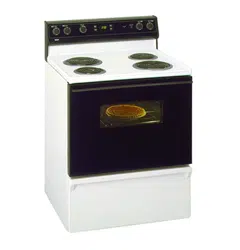Loading ...
Loading ...
Loading ...

18
Safety InstructionsOperating InstructionsCare and CleaningTroubleshooting TipsCustomer Service
Care and cleaning of the range.
Porcelain Oven Interior
With proper care, the porcelain enamel
finish on the inside of the oven—top,
bottom, sides, back and inside of the
door—will stay new-looking for years.
Let the range cool before cleaning. We
recommend that you wear rubber gloves
when cleaning the range.
Soap and water will normally do the job.
Heavy spattering or spillovers may require
cleaning with a mild abrasive cleaner.
Soapy, wet metal pads may also be used.
Do not allow food spills with a high sugar or acid
content (such as tomatoes, sauerkraut, fruit juices
or pie filling) to remain on the surface. They may
cause a dull spot even after cleaning.
Household ammonia may make the
cleaning job easier. Place 1/2 cup in a
shallow glass or pottery container in a
cold oven overnight.
The ammonia fumes will help loosen the
burned-on grease and food.
If necessary, you may use an oven cleaner.
Follow the package directions.
■
Do not spray oven cleaner on the electrical
controls and switches because it could cause a
short circuit and result in sparking or fire.
■
Do not allow a film from the cleaner to build up
on the temperature sensor—it could cause the
oven to heat improperly. (The sensor is located
at the top of the oven.) Carefully wipe the
sensor clean after each oven cleaning, being
careful not to move the sensor as a change in
its position could affect how the oven bakes.
■
Do not spray any oven cleaner on the oven
door, handles or any exterior surface of the
oven, cabinets or painted surfaces. The cleaner
can damage these surfaces.
Anti-Tip Device
(for kit number 342473)
WARNING:
All ranges can
tip and injury could result. Install the
Anti-Tip device packed with the range.
Follow the installation instructions below.
Tools needed:
■
Phillips head screwdriver
■
1
3
⁄
8
″ open end or adjustable wrench
The bracket attaches to floor or wall to
hold either the right or left rear leg
leveler. If fastening to the floor, be sure
that the screws do not penetrate electrical
wiring or plumbing. If this cannot be
determined, use shorter screws that will
not penetrate through flooring.
The bracket is packed inside the oven. Remove
and follow the instructions below.
Decide whether the bracket will be
installed on the right or left side of
the range location.
If the bracket side of the range is
adjacent to a cabinet, place the
bracket against back wall and cabinet.
If there is no adjacent cabinet, determine where
the location of the range side (painted outside
panel) will be. Place the bracket with its outside
edge at this location and against the back wall.
Determine whether you will anchor
the bracket to the floor or wall.
Fasten the bracket securely with the
screws provided. The screws are self-
drilling in wood, plywood, particle
and chip board, and most metal
framing.
If attaching to masonry you can buy suitable
screws and anchors at hardware stores. Use a
masonry drill to drill the required holes.
Using the wrench, back out the four
leg levelers at least two turns. See the
installation instructions for more
leveling information before
positioning range.
Slide the range into place. Be sure
the rear leg leveler fully engages the
slot in the bracket.
If the range cannot be moved back far enough for
the rear leg leveler to enter the bracket, move the
bracket forward as required and attach to the
floor in the new location.
Wall behind
range
Outside edge of
bracket to be
flush with left
or right side of
range
Adjacent cabinet
or final location of
range side panel
Make sure leg leveler engages slot.
Attachment to wall.
Wall plate
Bracket
Screw must enter
wood or metal.
Painted Surfaces
Painted surfaces include the sides and the
drawer front. Clean these with soap and
water or a vinegar and water solution.
Do not use commercial oven cleaners,
cleaning powders, steel wool or harsh
abrasives on any painted surface.
Loading ...
Loading ...
Loading ...
